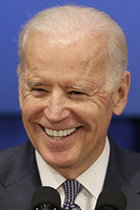The UA Cancer Center is taking part in Vice President Joe Biden's push to double the rate of progress in cancer treatment, diagnosis and prevention over the next five years.

 Vice President Joe Biden is taking aim on cancer, and the University of Arizona Cancer Center wants to help.
Vice President Joe Biden is taking aim on cancer, and the University of Arizona Cancer Center wants to help.
Last May, Biden's son, Delaware Attorney General Beau Biden, succumbed after a lengthy battle with brain cancer. Shortly after, Biden set up a task force to search for ways to increase everyone's odds for survival against cancer, which is still the leading cause of death worldwide.
The Cancer Moonshot was announced on Jan. 12, with President Barack Obama founding the official White House Cancer Moonshot Task Force two weeks later.
On Wednesday, the task force is holding its first nationwide Cancer Moonshot Summit, which will include conversations in communities across the United States, including Tucson at the UACC.
 Vice President Joe Biden (at first Cancer Moonshot meeting Feb. 1, 2016): "Solving the complexities of cancer will require the formation of new alliances."
Vice President Joe Biden (at first Cancer Moonshot meeting Feb. 1, 2016): "Solving the complexities of cancer will require the formation of new alliances."
WHAT: Cancer Moonshot Summit
WHEN: Wednesday, June 29, 11:30 a.m. to 4 p.m.
WHERE: UA Cancer Center - Kiewit Auditorium, 1515 N. Campbell Ave., Tucson
"The Moonshot cannot be achieved by one person, one organization, one discipline, or even one collective approach," Biden said. "Solving the complexities of cancer will require the formation of new alliances to defy the bounds of innovation and accelerate the prevention, diagnosis, treatment, and ultimately, a cure. It's going to require millions of Americans speaking up and contributing what they're able. That’s what the Cancer Moonshot Summit is all about."
These conversations, or "regional summits," will be the first time that individuals and organizations representing the entire cancer community and beyond — researchers, oncologists, care providers, philanthropists, data and tech experts, advocates, patients and survivors — will convene under the national charge to double the rate of progress toward a cure in the next five years.
 The goal of the summit is to spur discussions throughout the country and open the door for new collaborations, while creating a formal mechanism for individuals and organizations representing all types of cancers to have direct engagement with the Cancer Moonshot Initiative.
The goal of the summit is to spur discussions throughout the country and open the door for new collaborations, while creating a formal mechanism for individuals and organizations representing all types of cancers to have direct engagement with the Cancer Moonshot Initiative.
This summit will be the first to focus broadly on the more than 100 types of cancer, rather than on one specific form of the disease.
The UA Cancer Center has been selected to serve as a host site for one of the regional summits. The summit will include opening remarks from UACC director Andrew S. Kraft, a connection with the national summit via live streaming to hear Biden's comments from Washington, D.C., and roundtable discussions facilitated by some of UACC's top cancer experts.
The UACC is one of 45 comprehensive cancer centers in the nation and the only one headquartered in and serving the state of Arizona that has been designated by the National Cancer Institute as a Comprehensive Cancer Center, the NCI’s highest designation. The UACC's 73 research labs and more than 300 nationally and internationally renowned physician and scientist members work to bring the power of research to cancer prevention and treatment through a direct link between the latest research discoveries and patient care.
The event will be hosted at the UACC's Kiewit Auditorium from 11:30 a.m. to 4 p.m. Those interested in attending should RSVP to event coordinator Deb McDonnell.
OTHER RECENT ITEMS OF INTEREST FROM UANEWS:
- "UA Research Shows How Visual Perception Slows With Age" | June 20, 2016
Older adults experience deficits in inhibition, which can affect how quickly they process information visually, according to a new study involving the UA. The findings of Mary Peterson, PhD, director of the Cognitive Science Program in the UA Department of Psychology, and her colleagues were published recently in the Journal of Vision... - "UA Engineers Zero In on Ovarian Cancer" | June 6, 2016
Interim BIO5 Institute Director Jennifer Barton, PhD, renowned for her work in developing biomedical imaging, is identifying biomarkers and creating optical imaging tools to screen for a form of cancer often called a "silent killer" of women. - "UA College of Medicine Develops 'Gut on a Chip'" | June 1, 2016
The model of the human gastrointestinal tract mimics the conditions and processes that occur within the intestine. Frederic Zenhausern, PhD, says the UA team "is designing biological systems for studying the impact of the gut-brain axis." - "UA Researcher Kacey Ernst Maps Potential Risk Areas for Zika" | May 26, 2016
Kacey Ernst, PhD, MPH, a UA associate professor and infectious disease epidemiologist, testifies before a U.S. House subcommittee, saying that a recent study expects the Aedes aegypti mosquito to increase in numbers across the South and East. - "Women Experience Heart Disease Differently From Men" | May 9, 2016
Research shows women and health professionals both have difficulty recognizing symptoms of heart disease in women, which can lead to delayed treatment and incorrect diagnoses, says UA nursing professor Anne Rosenfeld, PhD, RN.

